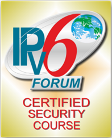Certifications
All Erion IPv6 courses are certified by the IPv6 Forum. Erion also has its own IPv6 certification programme.



IPv6 is the result of many years of research and activity by the international Internet community. IPv6 provides increased addressing space, improved routing, new features and support for transition from IPv4.
The implementation of IPv6 is inevitable and will impact on all companies that maintain, implement or use IP networks.
In this course, you will learn how to obtain implement and secure IPv6 and related protocols within your organisation on Linux. This course provides extensive hands-on sessions and in-depth technical analysis.
This course is ideal for network administrators, network support personnel, network designers, networking consultants, security managers, IT managers and directors.
A good knowledge of general networking concepts is assumed. IPv4 is reviewed as it is compared and contrasted with IPv6, but experience of IPv4 is necessary.
During the course there will be many opportunities for hands-on work. Each module has detailed exercises or demonstrations associated with it. Every delegate has at least one server provided for their own use.
Practicals are mainly carried out on Linux.
All Erion IPv6 courses are certified by the IPv6 Forum. Erion also has its own IPv6 certification programme.



All our lecturers are practising network consultants with extensive experience of IPv6 networking on Linux, Unix, Cisco IOS, Juniper and Windows in large commercial environments. They are ideally suited to bringing you an up to date analysis of the status of IPv6.
Erion is the world's leading IPv6 training company.
Our courses are available world-wide in our virtual classrooms accompanied by virtual labs. We also deliver on-site training and public training at venues around the world.
Please contact us if you are looking for training in your area.